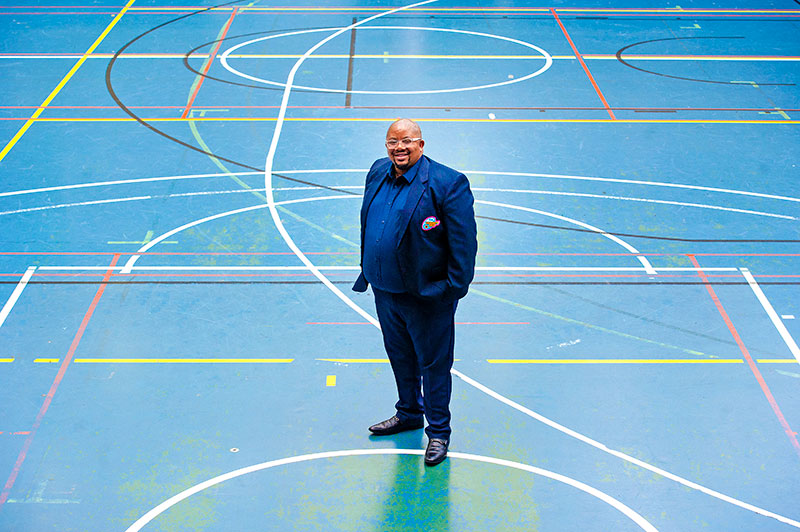Engagement key to unlocking UCT sport growth
05 October 2023 | Story Kamva Somdyala. Photos Lerato Maduna. Read time 4 min.
The University of Cape Town’s (UCT) new sport and recreation manager, Mark Bashe, has identified some immediate tasks to accelerate growth in his department: infrastructure, funding and engagement.
The mission is clear: UCT sport needs active participation to stake its claim at producing competitive athletes internally, locally and nationally.
It’s not by chance, Bashe believes, that he’s been thrust into this position because, there was a “sense of unease” when it came to leaving his previous position in KwaZulu-Natal to embark on a new chapter in the Western Cape.
“I’m a person of faith; I wasn’t feeling confident prior to the interview and my wife picked up on it and we decided to pray together … when I concluded the interview, I had an intuition that I had secured the job even before receiving the official offer,” Bashe said.
Sport, recreation, and wellness
Bashe has been in the fraternity for many years, first as a student of sports management at Cape Technikon (now the Cape Peninsula University of Technology), then as a sports practitioner working in both local and national government, including on large-scale events such as the 2010 FIFA World Cup in South Africa, where he was a member of the local organising committee.
He has spent the last decade heading the sport department at the University of KwaZulu-Natal and brings with him an exceptional experience, having previously interacted with his now direct colleagues through various intervarsity engagements. This simplifies his role, granting him more time to focus on his primary task of crafting a comprehensive strategy and plan that aligns perfectly with UCT’s Vision 2030.
Bashe actively participates in multiple facets of the university sports landscape, which encompass the following: serving as the current chairperson of the South African Heads of University Sport Forum; being a board member of the Varsity Cup board; holding a position on the Varsity Sports Exco; and serving as a member of the national executive committee of University Sport South Africa (USSA).
“I always group sport and recreation with wellness because the three have to work hand in hand as we deal with top athletes that play for national teams and also deal with athletes at varsity sport level; then those students who are at UCT and want to be a part of a collective, such as a club or team while enjoying student life,” said Bashe.
“We first need to get our students to participate and play in internal leagues to grow the strength of our teams and to best prepare them for national competitions.”
“As much as we host a lot of sport events, we need to bring student wellness into it. Therein lie opportunities to address students on taking care of their own health and wellness. This goal requires our department to work as a collective with other key stakeholders within the Department of Student Affairs (DSA).”
“We first need to get our students to participate and play in internal leagues to grow the strength of our teams and to best prepare them for national competitions. Students, as a tagline of the institution goes, must feel that they ‘are UCT’.
“Infrastructure is another priority for us: there needs to be a prioritisation of making our facilities world class through renovations and add-ons. Our power as an institution is massive. We are asking for alumni to support sport across the codes. Our strategy is to go to alumni of the various sport and alert them to the need to plough back. No amount is ever small,” said Bashe.
“Our team understands that as we move into the future, we can’t be a jack of all trades … we need to point to our strengths. We need to structure our programme in such a way that we identify our priority codes (athletes in provincial and national to put UCT on the map), as well as a focus on which codes must compete locally and which codes compete internally.”

“Transformation is another difficult, but necessary conversation.” UCT has a comprehensive transformation strategy, and as a sport unit, we need to ensure the clubs are aligned with both institutional and federation transformation policies. There is no benefit in creating an island outside of the broader sport community.
“Sport must become part and parcel of a holistic process for student life. We are on a mission to reignite the flame of sport and wellness: our plans speak to one goal: to take UCT sport and recreation to the next level; where it used to be, across all codes.
“We are bringing all clubs closer to the department because we are all part of UCT. Clubs enjoy their independence and their ability to develop and implement their own plans; however, there is only one unit that can bring us all together: the sport and recreation unit,” said Bashe.
 This work is licensed under a Creative Commons Attribution-NoDerivatives 4.0 International License.
This work is licensed under a Creative Commons Attribution-NoDerivatives 4.0 International License.
Please view the republishing articles page for more information.










